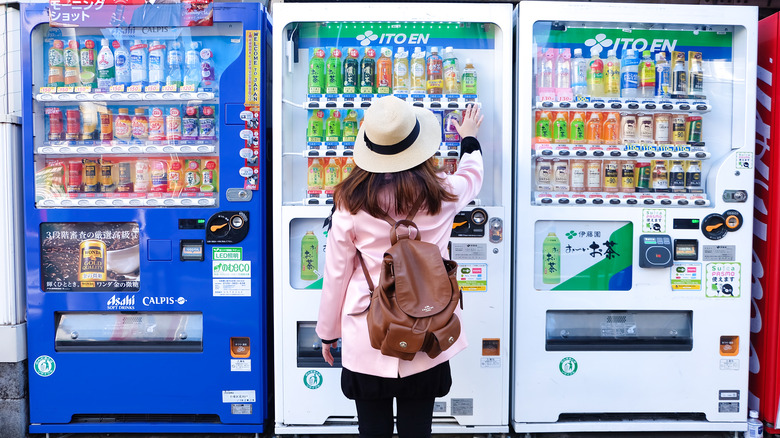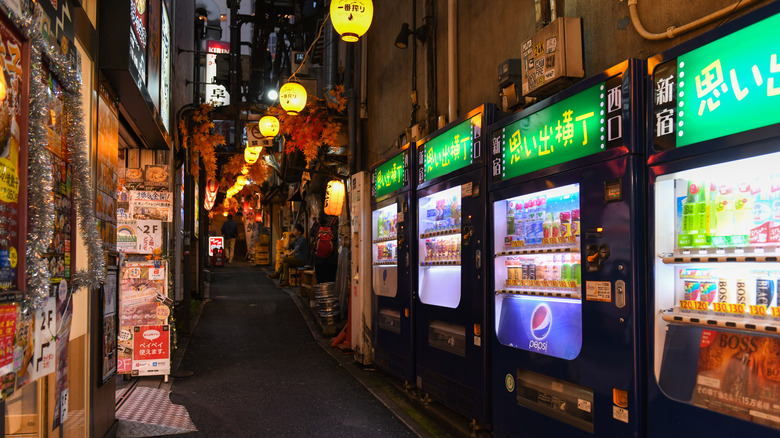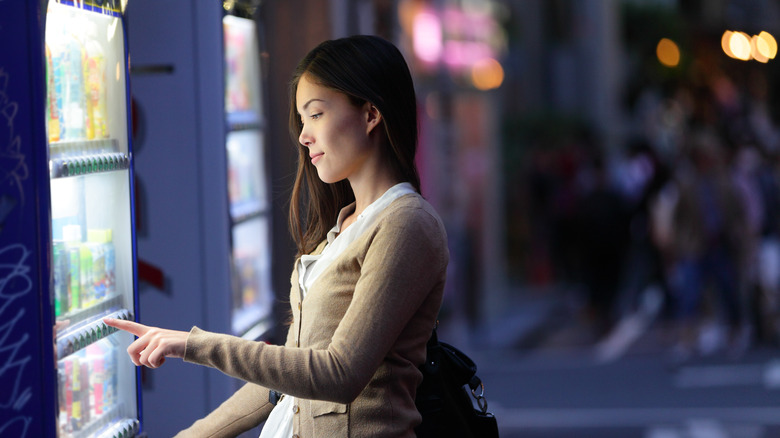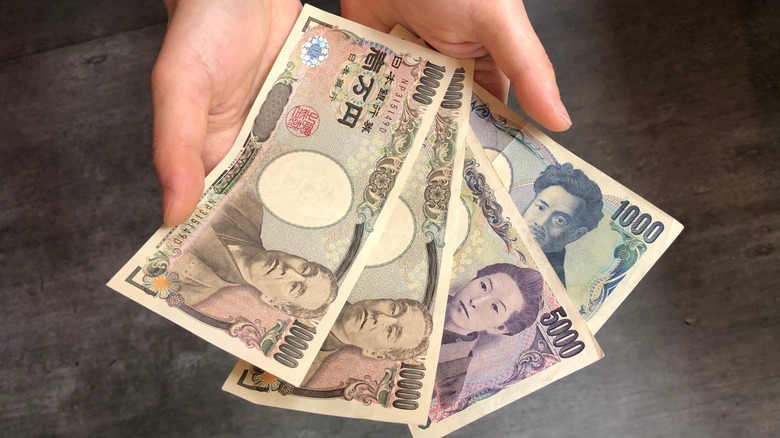Why There Are Vending Machines All Over Japan
One of the first things that visitors and newcomers to Japan notice, along with a distinctive lack of actual samurai walking around (sorry, they haven't existed for, like, 150 years), is all the vending machines. We're talking tons, folks. Entire rows of them, largely blue, sometimes white, full of hundreds of drinks at your button-pressing fingertips, along practically any street in any town in any part of the country. Cold drinks for summer, hot drinks for winter (color-coded blue and red, respectively), tea, coffee, canned soup in the corn or mushroom variety, deluxe varieties offering not just snacks, but entire meals: all are available. Tap your metro card (called a "pasmo" or "suica" card) or pop in some coins.
How many vending machines are we talking about? Over 5 million, as Live Japan says. In a country of 125 million people (per Worldometer), that's one machine per 25 people. And since we're assuming a single vending machine is bigger than a person, and taking into account that Japan is roughly the size of California (per My Life Elsewhere), vending machines just might be the second-most-populous occupants in the country.
Why so many, though? As Business Insider points out, there are a ton of practical, economic reasons why vending machines thrive in Japan, as well as lots of cultural ones. Cost of labor and real estate, revenue vs. overhead, ease of accessibility, standards of safety; all these reasons and more have gifted us a nation where vending machines abound.
A low-maintenance solution
As Business Insider says, vending machine sales across Japan totaled about $60 billion back in 2017. An annual report from the Japan Vending Machine Manufacturer's Association shows that vending machine use has been in a steady decline since 2009, but still rakes in an obscene amount of money.
So think about it: If you own a piece of land and want to accumulate a bit more money over time, why not invest in a vending machine? Real estate is at a premium nationwide. Much of Japan is mountainous and untillable, or otherwise already covered in rice fields and packed-in towns off highways. In cities like Tokyo, many homes and commercial buildings are often tucked into corners, behind other buildings, and designed with odd floor plans simply to fit into available space. If there's enough room to drop an income-generating box of drinks — like near the street — many businesses figure: why not?
Vending machines don't have to be tended to every day. You just leave them alone, refill once a week or so, collect the cash, and move on. They're a low-maintenance, practically zero-labor solution for a country very preoccupied with efficiency, saving time and money, and staying on the go. And in a country with an increasingly elderly population (as the Japan Times overviews), vending machines are the perfect solution for older people to just walk up to and pop in some change rather than poke over to a big store.
A premium on safety
As Business Insider correctly points out, another reason that vending machines work so well in Japan is because of an astonishingly low crime rate. For instance, there were a mere 1,511 robberies across the entire country in 2019, as Nippon says. Compare that to 267,988 robberies in the United States that same year, as the FBI reports. And, the U.S. population is less than three times that of Japan. In certain cities or areas of the world, it's not hard to imagine a vending machine being practically mauled to death so someone can save a buck, or because they're simply starving and have no money.
In Japan, folks leave their laptops untended in coffee shops when they go to the bathroom. In massive metropolises like Tokyo, they pick up entire phones and wallets and place them out of harm's way for their owner to retrieve. Folks return single-yen (about one cent) coins to others who dropped them in stores. This level of law-abiding honesty is the norm in Japan, and often shocking to those from other nations.
This is why some vending machines even sell alcohol and tobacco with no age verification. Others sell more expensive items like toys and hygienic products, while still others sell un-steal-able items like concert tickets. Similarly, subway and train stations will invariably have coin-operated storage lockers that remain just as safe as vending machines. All in all, the stage is set in Japan for automated, safe buying solutions.
A cash-based society
There are a couple of more reasons why vending machines are so ubiquitous in Japan. As Business Insider summarizes, cash, rather than cards, is still the norm in Japan. There are myriad reasons for this, such as an extreme cultural aversion to debt, no minimum monthly payments for credit cards (you have to pay the whole thing every month), and a relatively intractable banking industry that's been very slow to adopt the use of debit cards. There are a bunch of proprietary, Japan-only digital payment options like PayPay, as Japan Today covers, but it's still almost always easier to just use paper or coins. Using cash everywhere is also partly possible because the country is so crime-free.
Lastly, Japan has a love of oddball tech and gizmos. Robot greeters can be found at certain electronics stores, for instance. An entire region of Tokyo, Odaiba, is a manmade island full of tech exhibits like TeamLab that use state-of-the-art light projection to create works of art. Heck, even the tiny town of Takikawa in rural Hokkaido, the northernmost, snowy area of the country, deployed "robot wolves" to scare bears away from property. Lots of Japanese tech is kind of old-looking, or retro, like its karaoke machines. But still, folks love it.
So the next time you're in Japan, grab a drink. It'll be quite easy, we guarantee you.



